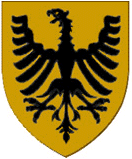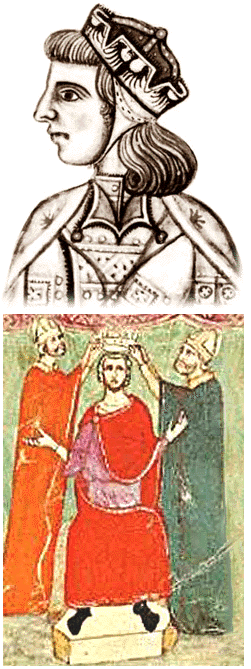King Manfred of Sicily - Best of Sicily Magazine (original) (raw)

 He may be little more than a footnote to history, but Manfred of Sicily reigned, if briefly, during a pivotal period. Had he received greater support from the nobility and the people, he might have withstood Papal efforts to install Charles of Anjou as king of Naples and Sicily, and this may well have led to the continued independence and prosperity of the island for a few more centuries instead of its rule from Naples, Aragon and then Madrid. History, of course, is based on what happens, not on what might have been, and the observation that it is usually written by the victors, though a cliché, is usually true.
He may be little more than a footnote to history, but Manfred of Sicily reigned, if briefly, during a pivotal period. Had he received greater support from the nobility and the people, he might have withstood Papal efforts to install Charles of Anjou as king of Naples and Sicily, and this may well have led to the continued independence and prosperity of the island for a few more centuries instead of its rule from Naples, Aragon and then Madrid. History, of course, is based on what happens, not on what might have been, and the observation that it is usually written by the victors, though a cliché, is usually true.
King Manfred (von Hohenstaufen), a son of Frederick II, ruled Sicily for just eight years until 1266, when his army was defeated by Angevin forces at the Battle of Benevento. Manfred was born outside marriage around 1232 to Emperor Frederick II (who was king of Sicily) and Bianca Lancia (Lanza), and later legitimised. Such matters were simpler in the Middle Ages than in subsequent periods, and Frederick left Manfred Prince of Taranto and vicar for Italy of his half brother (Frederick's legitimate son), Conrad IV. By all accounts, Manfred, who studied in Bologna and Paris, was, like his father, a learned and cultivated man. This in itself made him exceptional among medieval monarchs.
 Upon his father's death, Manfred, though not yet twenty years of age, acted to unite the kingdom against the subversive efforts of Pope Innocent IV until the arrival of Conrad in 1252. Unfortunately, Conrad was suspicious of Manfred and envious of his influence in Italy, and divested him of much property and wealth beyond Taranto. This was an unnecessarily divisive move within the Ghibelline camp.
Upon his father's death, Manfred, though not yet twenty years of age, acted to unite the kingdom against the subversive efforts of Pope Innocent IV until the arrival of Conrad in 1252. Unfortunately, Conrad was suspicious of Manfred and envious of his influence in Italy, and divested him of much property and wealth beyond Taranto. This was an unnecessarily divisive move within the Ghibelline camp.
Ghibellines supported the authority of the Holy Roman Emperor in Italy while Guelphs supported the authority of the Pope and, later, the House of Anjou "appointed" by the Papacy to the Sicilian throne; these movements were more prominent in the patchwork of cities and fiefs of northern and central Italy than in the south, where there was wide support for the emperor, who ruled as "King of Sicily." By the middle of the 1260s, the Ghibellines were essentially a party of Swabiansympathy while the Guelphs were supporters Angevin rule.
When Conrad died of malaria in 1254, Manfred supported and protected his young son, known to historians as Conradin ("Young Conrad"), acting as regent. Pope Innocent, hoping to control the boy, resented this, and excommunicated Manfred. (This was an old, tired and ridiculous papal ploy; at one point Frederick II had been excommunicated while already excommunicate, and Manfred was to suffer the same fate.) Nevertheless, Manfred negotiated with Innocent and even agreed to relinquish Apulia to the Pope in September 1254. This fragile peace was not to last.
When Papal troops seized the area around Naples, Manfred sought support from the loyal Arabs of Lucera and in early December 1254 defeated the Pope's army at Foggia. He thus defended his political position in Sicily and much of southern Italy. At the same time, he sent military aid to some of the Ghibelline towns of Tuscany. When Innocent died his successor, Alexander IV, excommunicated Manfred, but this did not deter his military efforts against Papal power, which he effectively crushed by 1257 by winning a series of small battles and becoming Conradin's vicar.
In 1258, Conradin was rumoured to have died and Manfred was crowned King of Sicily. Confronted with the truth (that Manfred was still alive), Manfred refused to abdicate, feeling that Sicily needed a strong --and present-- ruler. He consolidated his power in Tuscany and wed his daughter (by Beatrice of Savoy), Constance, to Peter III of Aragon. Manfred was then excommunicated by a third pope, Urban IV.
By 1263 Urban had convinced Charles of Anjou, younger brother of Saint Louis, to accept the Sicilian Crown. Such abuses of Papal authority in the temporal realm were to have grave consequences during the sixteenth century, but for now the pontiffs often managed to create and depose kings so long as their actions were backed up by military force, and this Charles eventually brought to bear.
The armies of Manfred and Charles did battle at Benevento in February 1266. Manfred was defeated and killed. Conradin was killed in October 1268 following his defeat at the decisive Battle of Tagliocozzo. With his death the Hohenstaufen dynasty receded into the pages of Sicilian history. In 1282, however, the War of the Sicilian Vespers brought Peter of Aragon to Sicily as king, a dynastic right claimed by right of his wife, Constance, as Manfred's daughter. For over a decade Hohenstaufen sympathisers had worked to plan this uprising, exploiting the anti-Angevin sentiments of both the Sicilian nobility and the general population. Aragoneserule, though initially welcome, eventually led to administration of Sicily from afar. Under Charles I and his immediate descendants Naples became a royal capital, eventually surpassing Palermo and Salerno in importance. The War of the Vespers and its immediate aftermath extended Sicilian power and influence for a few decades, but any hope of prolonging Sicily's medieval golden age ended with Manfred's death.
Manfred married three times. Beatrice of Savoy (daughter of Amedeo IV, Count of Savoy) bore his daughter Constance. Dante placed Manfred outside the gates of Purgatory, waiting to enter, but his place in Sicilian history is less tenuous than that. He could be said to have embodied the intellectual and independent spirit of the father who he barely knew.
About the Author: Palermo native Vincenzo Salerno has written biographies of several famous Sicilians, including Frederick II and Giuseppe di Lampedusa.